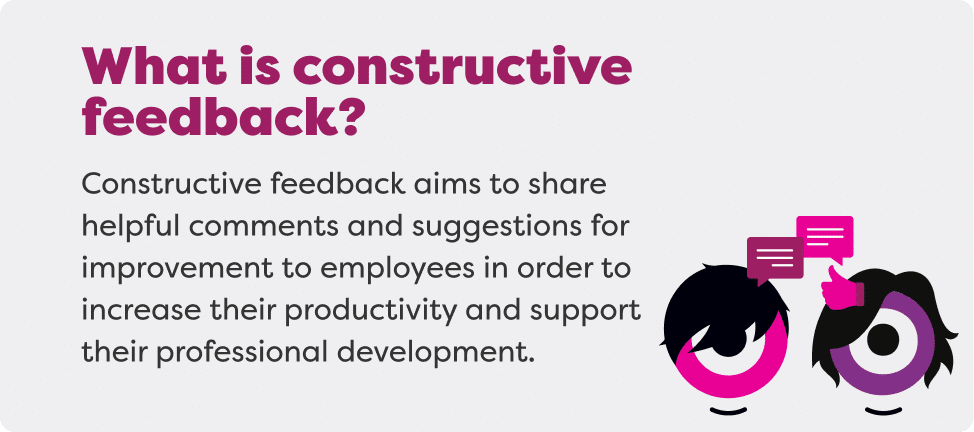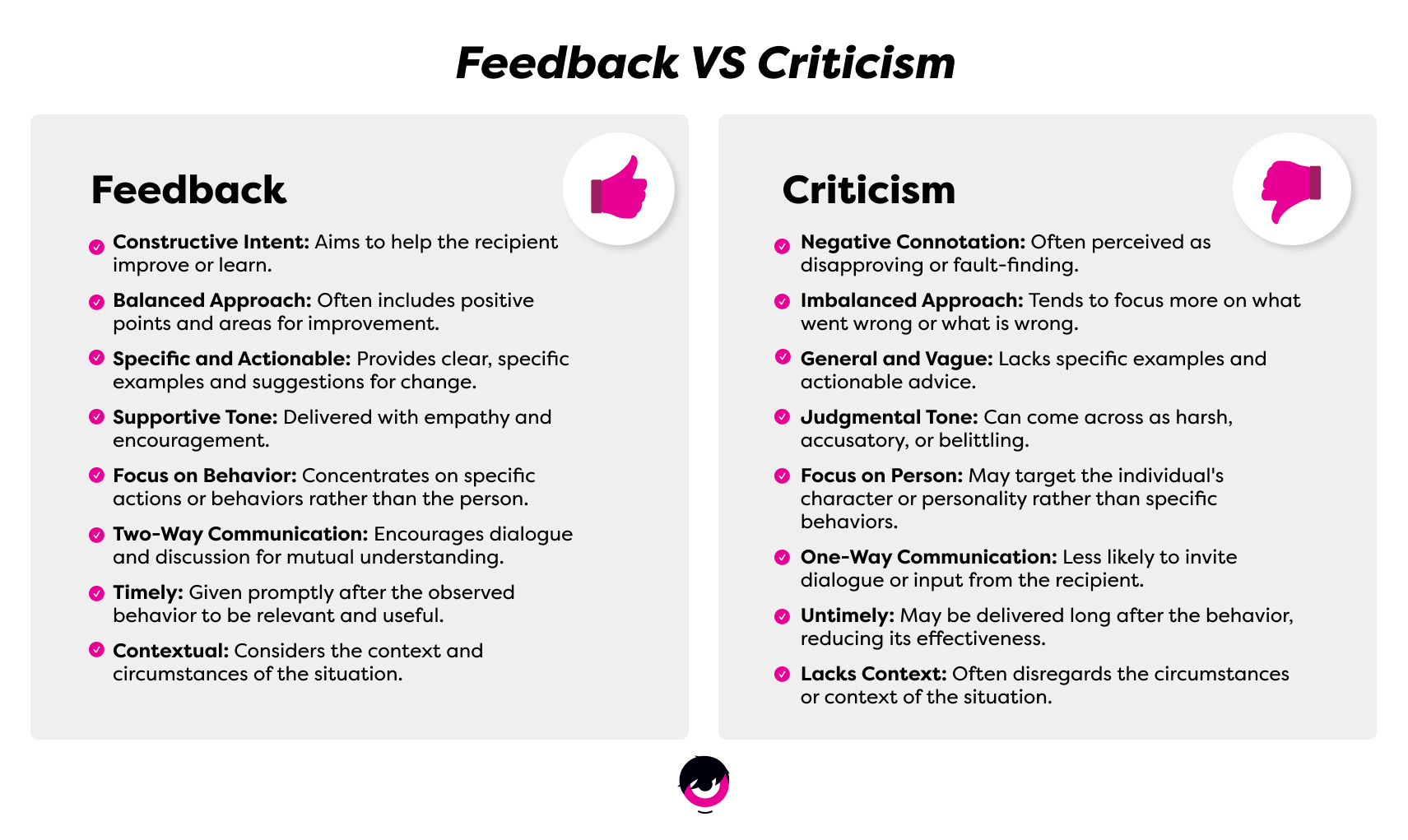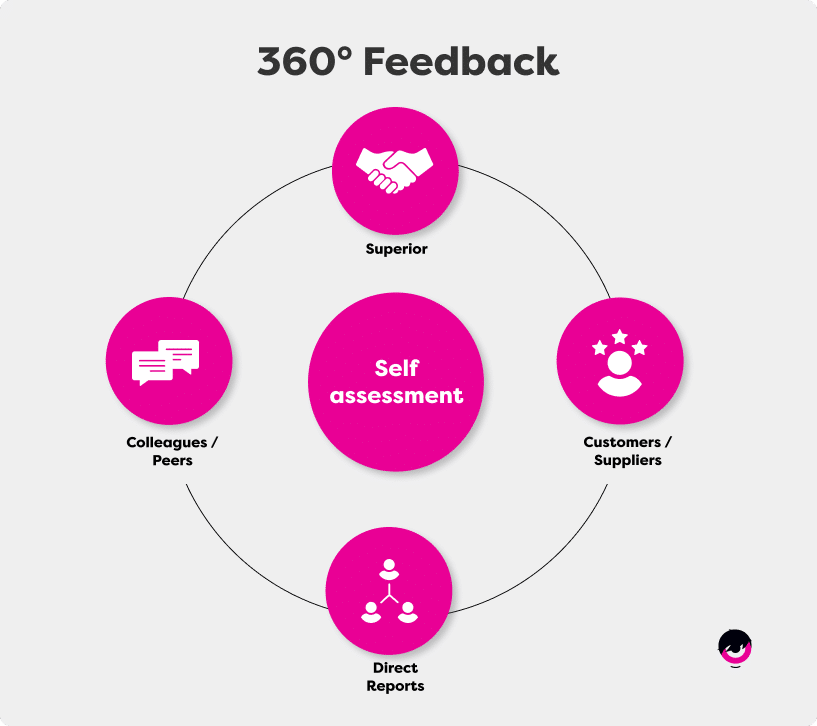Did you know that 80% of employees would rather receive regular feedback than experience annual performance reviews? Constructive feedback matters even more for younger generations of employees and new hires. In 2024, businesses and managers should think of ways to improve communication and feedback strategies in the workplace. Our constructive feedback examples will help you implement the best practices and improve employee engagement!
What Is Constructive Feedback?
Constructive feedback aims at providing helpful comments, advice and suggestions for improvement to employees to increase their productivity and support their professional development. Effective feedback should focus on the employee’s work, behaviors, strengths and weaknesses, and not be an attack on their personality.
Many people find this one of the most difficult parts of becoming a manager. You will learn more quickly if you ask more experienced managers for advice or go on a course that covers this.

The difference between feedback and criticism
Constructive feedback can be both positive and negative, but plain criticism that negatively comments on employees’ personalities and individual traits should be banned from the workplace.
Criticism often ressembles mockery, pettiness, and can even lead to workplace bullying if managers give a bad example to employees.
On the other hand, feedback aims to reach positive outcomes by supporting growth, providing guidance, and optimizing processes and skills. It is shared with respect and transparency.

40 Constructive Feedback Examples by Type
Positive Feedback
Commenting on strengths and skills is especially important during employee performance reviews, but you should give positive feedback on a regular basis. After all, expressing recognition will make you stand out from other employers: only 12% of employees feel appreciated at work, and employee recognition supports outstanding performance. Here are some examples of positive feedback phrases you can share with your team:
1) “You did a great job on this project, keep up the good work and feel free to tell me if you need support!”
2) “You are really good at managing your schedule and consistently meeting deadlines. Your time management skills are truly valuable to the team.”
3) “I appreciate your innovative thinking and creative ideas. Please continue sharing your input with us!”
4) “You have a positive attitude and your enthusiasm makes all the difference in our daily work.”
5) “I can see that you work hard and I think we can find ways to help you keep good performance levels.”
6) “You are able to think outside the box and create innovative solutions to overcome challenges. It is inspiring to see!”
7) “You have great leadership skills. You know how to provide guidance, support, and lead by example, which motivates the entire team and creates a positive work environment for everyone.”
8) “I appreciate the fact that you are willing to take on new responsibilities and learn new skills. It shows that you are motivated, dependable, and a real asset for the entire organization.”
9) “You are dedicated to your job and have a great work ethic, which sets a positive example for others to follow.”
10) “I appreciate your attention to detail and your organizational skills, these qualities strengthen our workflow and help us work toward a common goal.”
Constructive Feedback
While positive feedback is great, constructive feedback and negative feedback are crucial to foster employee development. Constructive feedback needs to identify areas of improvement and provide suggestions and solutions to reach specific goals. Of course, you should be careful with your words and show empathy and transparency.
11) “When facing new challenges, you should take the time to assess the situation and try to use your creative thinking to overcome them.”
12) “During team meetings, please consider giving space to your coworkers so that they can share their ideas.”
13) “We can address tips to optimize your organization skills to help you meet deadlines and gain productivity.”
14) “I noticed that you were struggling to complete tasks and projects on time, so let’s figure out ways we can improve together.”
15) “I appreciate your hard work, but I noticed you have a tendency to take on too many tasks and become overwhelmed as a result. Remember to take your time, delegate your projects, and seek support if needed.”
16) “Let’s work together to improve the way we prioritize tasks so that we can ensure timely completion of your projects.”
17) “Your report was very informative, but I noticed a few errors. Let’s skim it together to identify the issues and work on accuracy.”
18) “I feel like we should work on a weekly schedule so that we can identify which tasks are most time-consuming or interesting to you and improve productivity.”
19) “I noticed that it can be difficult to focus on a single task during your work days. We could define focus hours during which we would avoid distractions such as meetings and messages to help you get over this hurdle.”
20) “The work you did was great, but I feel like we could focus our approach on customers’ needs and tailor it to their specific situation next time.”
Feedback for Professional Development Opportunities
You can go beyond highlighting strengths and weaknesses by using employee feedback examples specifically targeted to foster career development. This meaningful feedback goes hand in hand with ongoing learning strategies – you cannot simply encourage growth and not offer training opportunities afterwards!
21) “You can enhance your project management skills by using a specific project management software. Here are my recommendations.”
22) “You could improve your leadership skills by taking on a mentoring role with someone who recently joined the team.”
23) “It would be interesting to create a knowledge base on which you can write down all your daily processes so that we can think of ways to improve them.”
24) “We can organize training sessions on this specific skill to help you learn and grow.”
25) “Would you be interested in joining a communication workshop to help you optimize your people skills?”
26) “I see you have improved quite a bit on many aspects of your position. Here is how we can take you to the next level!”
27) “I know you wanted to optimize your skills on this specific topic, here are a few solutions in that regard.”
28) “Ongoing training on this set of skills would help you complete your projects more efficiently.”
29) “I have come up with a list of ideas to help you grow in your position and I want to hear your thoughts on it.”
30) “I feel like you are ready to grow in your career with us, here are a few suggestions we can study together.”
Teamwork Feedback
You should also share regular feedback on people skills such as internal communication, teamwork, and collaboration. These skills are crucial for sharing peer feedback such as 360-degree feedback – which should definitely be part of your strategy!
31) “You consistently support your coworkers and it helps create a great team dynamic. Keep up the good work!”
32) “You are always happy to help your colleagues, which is great. Remember that you can also ask for support anytime you need it.”
33) “Thank you for actively participating in team meetings, your input is always appreciated.”
34) “Our collaboration is always easy and insightful, you are a great team player.”
35) “You can improve the way you communicate with your teammates to make sure everyone is on the same page.”
36) “The entire team would benefit from you sharing your input and insights during team meetings.”
37) “Before taking on this project, I would appreciate it if you could ask your colleagues what they think.”
38) “I would like you to focus more on sharing creative ideas with team members in the next few months.”
39) “When providing feedback to your colleagues, make sure to illustrate your point with examples and ideas for improvement.”
40) “I have noticed communication issues and conflicts among the team and I think we should figure out a way to address them together.”

Using these constructive feedback examples and tips will help you improve communication and overall human resources management. The end goal is to strike a balance between positive feedback and areas that require development to create a constructive feedback culture that benefits everyone in your organization. Remember to be transparent and use your communication skills to build the best, most productive and growth-oriented environment in your company!
Discover how performance review software can support your feedback culture:
Discover our fully customizable and flexible features!

